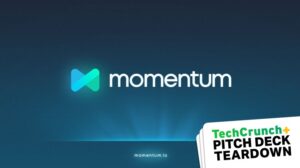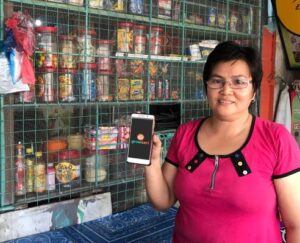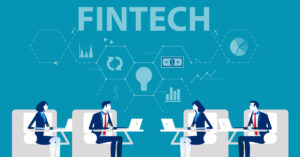Image credit: Trade Republic founder Christian Hecker. © Trade Republic
Is Trade Republic a neo broker or a neo bank? The latter, according to the founders. They want their app to be a new kind of savings account, not just a tool to quickly buy stocks. Investors also believe in it: After a mega-investment by Sequoia Capital and other well-known VCs, the valuation of the Austrian scale-up rose to 4.3 billion euros – more than N26, Monzo or Starling Bank together.
In a lengthy interview with Trending Topics, Christian Hecker, who founded the startup in 2015 with Marco Cancellieri and Thomas Pischke, talks about low interest rates, inflation, zero-fee trading and why Trade Republic is actually a bank.
Recently, the winners of the 2021 Future Hamburg Award were announced.
Trending Topics: Not so long ago, neo banks were the stars of the fintech world. Now all of a sudden, all eyes are on the neo brokers. A clear sign is that Trade Republic now has a significantly higher rating than N26 from Germany. Why did this happen, what has changed in the market?
Christian Hecker: More and more people realise that they have to close their pension gap due to demographic change, low interest rates and inflation. The true extent will only be visible in the future. It is all the more important for everyone to take their pension provision into their own hands. And that’s what we enable – simply and transparently.
Trade Republic seems more and more like a bank. There is deposit protection of 100,000 euros, the complete company name is Trade Republic Bank, and your co-founder Thomas Pischke said it would be the “new savings book” for users? Do you want to become a bank?
Our goal is to create the bank of the future and to enable people to build up wealth long-term. To this end, we are constantly expanding our offering – whether it’s new commission-free savings plans, trading in cryptocurrencies or expanding to the universe of derivatives. Trade Republic is meant to be the new form of savings account.
Bitpanda, BUX, nextmarkets, Scalable Capital, and so on: there is a plethora of competition. What do you think, why is Trade Republic better?
A lot has happened here in recent years. There is an upturn in the market, to which we have contributed. A diverse offer range is good for consumers. Anyone looking for simple, secure and commission-free access to the capital markets in order to build up wealth over the long term has come to the right place. The real competitor is the piggy bank. Too many people do not invest their money at all, with all the consequences that this has for the individual but also for society as a whole.
You have hundreds of thousands of users investing through their app for the first time in their life. How do they invest? Do you prefer stock picking or an ETF savings plan? How is that distributed?
Savings plans are at the center of our offer. 80 percent of our more than one million customers use our royalty-free and individually configurable share and ETF savings plans. But some customers prefer to invest in individual stocks. Since April we have enabled our customers to trade in cryptocurrencies, initially only in Germany.
They also offer leveraged knock-out derivatives that can be shorted. Isn’t that a little too complex and dangerous for many of the first-timers and newbies?
Some of our customers have already gained experience in the financial market before they come to our platform. We want to address as many people as possible, who of course also have different needs and more or less prior knowledge. This is also reflected in our offering. We recently expanded the range of products for experienced investors by expanding the range of derivatives.
During the WallStreetBets campaign, Trade Republic temporarily halted trading certain stocks and later apologized to its users for this. Will you ensure that there will be no such interferences in the future?
The situation at the time was unprecedented. To ensure the availability of the systems for all of our customers, we had to decide not to accept buy orders for a few stocks for around three hours. Only less than eight percent of our customers have invested in these so-called meme stocks. The next morning, after we had significantly increased capacities that same night, trading was running without restrictions. As a result, we continue to invest heavily in the technical infrastructure of our platform.
Cryptocurrencies are also available at Trade Republic. Can a neobroker today even do without crypto?
Diversification is a vital issue when building long-term wealth. Crypto has in recent years developed into a highly sought-after asset class. We are fully compliant to offer trading in cryptos thanks to state regulation and the reliability of a German banking license.
Trade Republic, like other brokers, advertises commission-free trading. But of course nothing is for free in this world. How exactly do you earn money when a user buys a share? Can you illustrate that?
Brokers generally have two sources of income: on the one hand, commissions from the customer; on the other hand, the fees customary in the market, which almost every broker receives from the marketplace to which customer orders are forwarded. As a technology company, we are so efficiently positioned to offer high quality at a fraction of the costs of other providers who often use outdated IT infrastructure or have not automated processes.
The EU, but also the Austrian financial market supervisory authority, has its sights set on the popularly advertised zero-fee trade. Will you have to present a more transparent cost structure for users?
We do that right from the start. We are already obliged to do this today. But it was always clear to us that we wanted to offer our customers maximum transparency and comprehensibility. One euro flat rate for third-party costs per trading transaction, no order commission, no custody fee – everyone can understand our price model.
France, Germany, Austria – what are the next markets you want to enter? Is the USA also a destination? Do your investors, including Sequoia and Peter Thiel, want to see the app there too?
Our focus is clearly on Europe. We have set ambitious goals for ourselves and would like to give all Europeans easy and inexpensive access to the capital market in the coming months and years.
Robinhood will soon be listed on the US stock exchange. Is the app a role model for Trade Republic? Or would you rather keep your hands off elements like gamification?
Let me be clear: the American and European markets are very different. In this respect, our business model is less comparable to Robinhood than you might think at first glance. But of course, we keep our fingers crossed for Robinhood for a booming stock market launch.
This article first appeared in German on Trending Topics.









